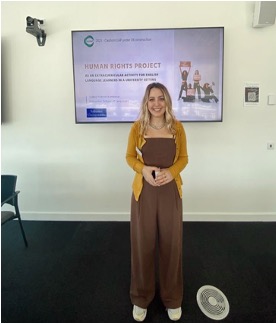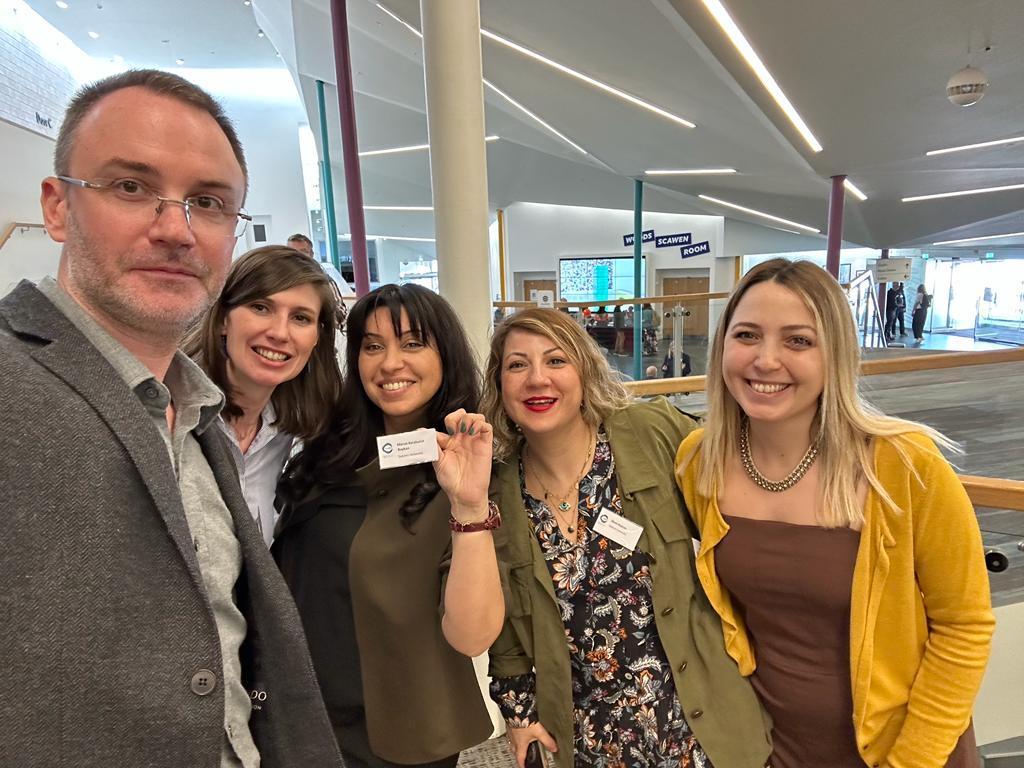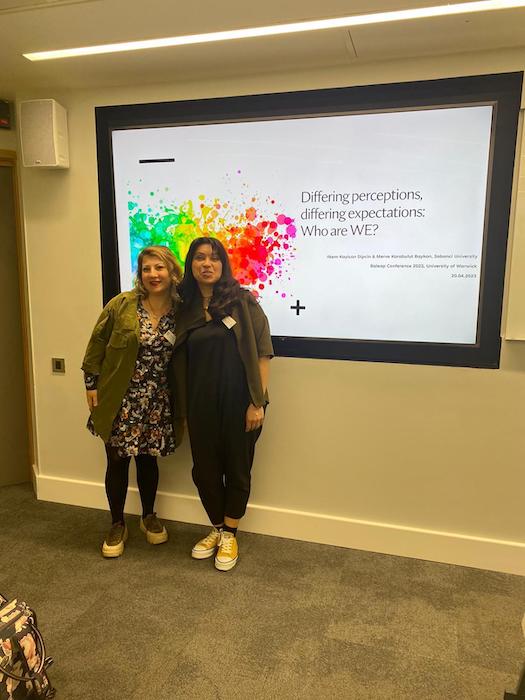SL in BALEAP 2023
SL in BALEAP 2023: Observations, Impressions & Experience
by Ilkem Kayıcan Dipcin, Merve Karabulut Baykan, Michael J. Thomas and Tuğba Yıldırım Kumbasar
Tuğba Yıldırım Kumbasar
 I had the opportunity to attend the BALEAP Conference, which was held at the University of Warwick from April 19-21, where I delivered a workshop titled "Human Rights Project as an Extracurricular Activity for English Language Learners in a University Setting". During the workshop, I had the chance to share the exciting design and implementation process and provide examples of individual and collaborative tasks completed by the students. Results of the study were also discussed, including reflections and evaluations completed by students at different stages of the project. Participants expressed keen interest in the project and provided valuable feedback during discussions on its potential impact on students' perception of human rights in the EAP context, which I will consider when revising it for future offerings.
I had the opportunity to attend the BALEAP Conference, which was held at the University of Warwick from April 19-21, where I delivered a workshop titled "Human Rights Project as an Extracurricular Activity for English Language Learners in a University Setting". During the workshop, I had the chance to share the exciting design and implementation process and provide examples of individual and collaborative tasks completed by the students. Results of the study were also discussed, including reflections and evaluations completed by students at different stages of the project. Participants expressed keen interest in the project and provided valuable feedback during discussions on its potential impact on students' perception of human rights in the EAP context, which I will consider when revising it for future offerings.
As it aligns with my area of research interest, I attended some sessions that focused on creative pedagogies. One such session, titled "Deconstructing Spoken Communication in the Creative Disciplines” (Jennifer Sizer, Clare Maxwell, Clare Carr, Jane Vickers, Zoe Gazeley-Eke) fostered meaningful discussions as we reflected on our experiences with spoken communication both within and beyond the classroom settings, both in the creative and in other academic disciplines. The exchange of ideas and perspectives during this session was truly enlightening. I suggest checking out the reading list on their website, which may offer some valuable insights that you may find worth exploring.
Given my interest in co-curricular activities, I also found the session titled "Integrating Community Engaged Learning Initiatives into the Academic English Classroom" by Jennifer Lightfoot and Daniel Riccardi from the University of British Columbia to be particularly interesting. The presenters shared a concrete example of a CEL project that aimed to foster student engagement with their host community by working on issues related to environmental sustainability. The outcomes of the project were impressive, and it was truly inspiring to see how the students' work was used to inform the public about the need for environmental sustainability. In my opinion, our international students in SL who are learning Turkish as a foreign language would greatly benefit from a similar project that connects them with the local community and culture, just like the students in the presented project who were learning English as a second language in Canada.
Overall, the conference met my expectations by providing a wide range of sessions that aligned with its promise of "a critical look at every aspect of EAP." Each session I attended offered unique insights that have enriched my understanding of EAP and I look forward to implementing them in my future work. I feel grateful to have had the opportunity to participate in such an outstanding event.
Michael J. Thomas
It was a pleasure to be able to attend and present at the 2023 BALEAP conference held at Warwick University. The aim of my paper was to present the findings of a research project conducted by Kasaandra Robertson, İlkem Kayıcan, Merve Karabulut and myself over the past few years into how various stakeholders within the SL-SPS course perceive the role of EAP practitioners within academia. I was delighted with how my paper was received, as well as by the lively debate that followed. It was especially encouraging to observe many of the concerns that initially prompted our research reflected in the comments of the participants not only of my own presentation, but also the many other fascinating presentations and workshops I had the pleasure to attend.
 One of the most interesting was by Alex Ding and Ian Bruce (Silo Busting in academic language research: a fresh look at the elements of academic language). In their paper, they reported on an ongoing project concerning their attempt to develop a comprehensive framework analysing the dimensions of academic language based on Ferguson’s (1997) framework, based on the interaction between the social, linguistic, and discursive aspects of language use.
One of the most interesting was by Alex Ding and Ian Bruce (Silo Busting in academic language research: a fresh look at the elements of academic language). In their paper, they reported on an ongoing project concerning their attempt to develop a comprehensive framework analysing the dimensions of academic language based on Ferguson’s (1997) framework, based on the interaction between the social, linguistic, and discursive aspects of language use.
Especially interesting was ‘The Use of Artificial Intelligence in Academic writing: Implications of EAP’, presented by Debra Jones and Neil Adam Tibbets, of Bristol University. This is an issue that is increasingly of concern to us in the SL, and one that I was eager to hear their insights into. Although their paper didn’t focus entirely on the use of ChatGPT by EAP students, but more broadly on how technology in general is used by students and perceived by teachers, this was inevitably the issue that received the most attention and sparked the most debate. In short, their research indicated considerable confusion, not only on the part of students, but also teachers, concerning how best to employ newly developing generative AI technology. Rather than treating AI as an existential threat, however, their opinion was that the inevitable opportunities presented by this new technology can best be put into use when done so in as open and transparent a way possible. This means the need for the development of comprehensive guidelines at an institutional level, and produced in conjunction with teachers and students alike, outlining acceptable practices in the use of AI technology in an academic context.
On the whole, all of the presentations and workshops I had the chance to attend, including the two I’ve outlined above, were extremely thought provoking and professionally inspiring.
Merve Karabulut Baykan & İlkem Kayıcan Dipcin
After a very long time, we attended our first post Covid international event last week at the University of Warwick. Baleap 2023 – Caution! EAP under Deconstruction did not disappoint. The sessions offered fresh ideas and a unique perspective towards some of the issues that I have recently been interested in such as the place of AI in academia as well as the identity of EAP practitioners in the global context.
 As well as participating in a number of inspiring sessions, we led an open community discussion session on the 20th of April titled ‘Differing Perceptions, Differing Expectations: Who are EAP practitioners within academia?’. The format or the genre of the session is a brand new one, where the main aim is to share the presenters’ stance and experience as much as providing space for the active participation of the audience. In that regard, I observed the richness of scenarios we, as the EAP practitioners, operate in. Despite the abundance of collaboration methods, two points stood out in my observation. The first was the common eagerness in the EAP practitioners to be recognized as equals with faculty members in terms of working hours, pay and other fringe benefits. And the second point that surfaced was the desire to pass on the pedagogical and methodological expertise in both teaching and testing to the faculty to better facilitate the learning in the whole of their respective institutions. I left the session contemplating on possible ways to increase receptive communication and meaningful collaboration among the stakeholders in academia, which would break the mold, and free the EAP practitioners from the support service box we seem to be put into.
As well as participating in a number of inspiring sessions, we led an open community discussion session on the 20th of April titled ‘Differing Perceptions, Differing Expectations: Who are EAP practitioners within academia?’. The format or the genre of the session is a brand new one, where the main aim is to share the presenters’ stance and experience as much as providing space for the active participation of the audience. In that regard, I observed the richness of scenarios we, as the EAP practitioners, operate in. Despite the abundance of collaboration methods, two points stood out in my observation. The first was the common eagerness in the EAP practitioners to be recognized as equals with faculty members in terms of working hours, pay and other fringe benefits. And the second point that surfaced was the desire to pass on the pedagogical and methodological expertise in both teaching and testing to the faculty to better facilitate the learning in the whole of their respective institutions. I left the session contemplating on possible ways to increase receptive communication and meaningful collaboration among the stakeholders in academia, which would break the mold, and free the EAP practitioners from the support service box we seem to be put into.
The highlight of the conference to me was to meet Alex Ding and Ian Bruce, who are the writers of most of the sources we referred to while we were preparing for the conference. Our story began when we came together to write a chapter for their latest book but were not accepted. It was then we decided to turn our study into research. Incidentally, Ian Bruce attended our session, which was a very pleasant addition to our experience.
Other than that, we can say that universities worldwide are alarmed concerning ChatGPT and other AI tools and it seems like there is an urgent need to come to a consensus as to how to approach the matter. In this respect the session entitled “Will the next student essay be written by AI?” by EAP colleagues from Xi'an Jiaotong Liverpool UniversitY, China and the one Michael mentioned above were very useful to see that many universities around the World have conufions about how to approach it and suggest the fact that it is our new reality and it has to be embraced by finding ways to integrate into the curriculum.
